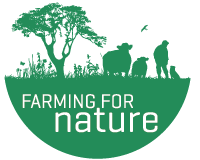Suzanna Crampton
FARMING FOR NATURE AMBASSADOR 2019
Suzanna’s farm is near Bennetts Bridge, in Co. Kilkenny. The farm’s species-rich meadows and pastures, woodlands, parkland, and numerous stand-alone mature trees, form a haven for local wildlife. She farms 12 acres on which she has 30 ewes and followers. They have access to a mixed sward with 17 different species of grasses alone. Suzanna practices regenerative agriculture with a rare breed of sheep that is triflective (milk, meat, fleece). She designs blankets from the wool that she has won awards for over the years. Additionally, a decades-old traditional orchard provides bountiful fruit and further herb-rich grazing for her sheep, with mature hedges that add even more habitat diversity for native plants, insects and birds. Suzanna regularly undertakes public engagements speaking to local, national and international audiences about regenerative farming. Suzanna was nominated in 2019 and awarded the Farming For Nature Honorary Ambassador 2019 role in January 2020.
NOMINATION OUTLINE:
Suzanna’s farm is near Bennetts Bridge, in Kilkenny’s beautiful Nore Valley, and represents a stunning show home for her farming ideas. Suzanna embraces a suite of farming practices that results in healthy animals and high-quality produce, while simultaneously encouraging farmland biodiversity to thrive. At Suzanna’s farm, farming and nature occupy the same space, and are not forced into distinct zones lying adjacent to each other. The farm’s species-rich meadows and pastures, woodlands, parkland, and numerous stand-alone mature trees, form a haven for local wildlife. Additionally, a decades-old traditional orchard provides bountiful fruit and further herb-rich grazing for her sheep, with mature hedges that add even more habitat diversity for native plants, insects and birds. Suzanna works with others to better understand how her approach benefits various aspects of farmland ecology: for example, soil life and the native bee species resident on her farm.
Suzanna avoids pesticides and artificial fertilizers as she believes progressive farmers do not require them. She feels that by encouraging diverse pastures, nature feeds the soils that feeds the plants that feed her livestock: this nutritious and herb-rich diet subsequently promotes animal health and wellbeing and, ultimately, the quality of produce. Suzanna farms only a small acreage and recognizes that her farm must create high-value products if it is to remain a successful and financially viable business. Her Zwartbles sheep are sold for meat or breeding and she is highly active in promoting natural fibres produced by Irish farming. She sells her 100% Irish wool yarn and blankets under the Zwartbles Ireland brand, and works with the nearby heritage Cushendale Woollen Mill to further promote her fibre products.
Suzanna is passionate about bridging the widening gap between rural farm communities and their urban neighbours. She is a founding member of the Zwartbles Sheep Associations Southern Ireland Branch, South East Women in Farming Ireland and, most recently, the Regenerative Farming Ireland group. Suzanna regularly undertakes public engagements speaking to local, national and international audiences. She has been interviewed for radio and television, been involved with films and documentaries about farming, and recently spoke at the Oxford Literary Festival. Suzanna’s photographic skills are showcased on banded postcards and calendars, which are made available on-line and to the many individual visitors and tour groups she hosts at the farm.
Suzanna also provides a leading social media interface between Irish farming and local and international audiences, concerned primarily about the what, where, why, and how she farms her sheep flock. From her social media presence arose Harper Collins’ invitation to write Bodacious: The Shepherd Cat. The book is about sheep farming; its realities, highs and lows, and the hardships and pleasures of farming livestock. It is not a sentimental view of farm life, but seeks to encourage young and old to develop an interest in farming, be curious as to where their food arises, and to explain how progressive farming practices can result in quality produce and still enhance the wildlife she is so passionate about. A sequel can be expected!
Nominator: Simon Hodge, Research Assistant, Trinity College Dublin





